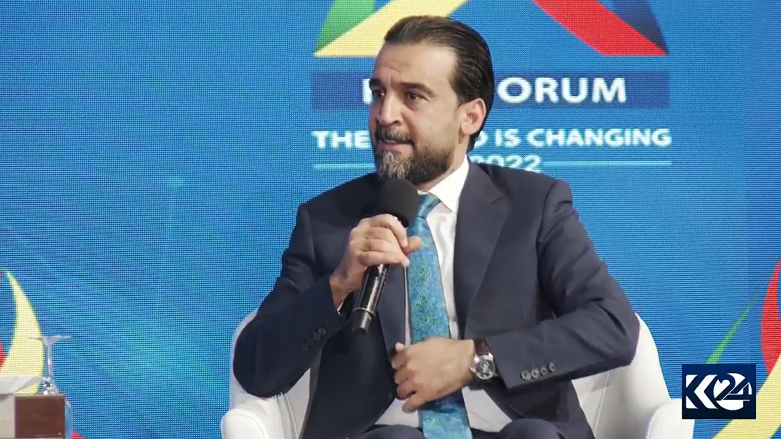Leaning towards consensus-based govt. formation a factor for resignation, says Al-Halboosi

ERBIL (Kurdistan 24) – The changing trend toward forming the new Iraqi government based on “consensus” is one of the factors behind the to-be-submitted resignation of the current Speaker of Parliament Mohammed Al-Halboosi, the official revealed on Monday.
Earlier Monday, the Iraqi parliament released Wednesday’s session agenda, in which the resignation of its speaker is one of the topics of discussion for the lawmakers.
During the fourth forum of the Al-Rafidain Center for Dialogue in Baghdad on Monday evening, Al-Halboosi explained the factors behind the resignation he is set to submit during the planned session in order to be approved by the legislators.
Kurdistan 24 is the media sponsor of the political event in Baghdad, which is set to continue until Thursday.
To defy the current political stagnation, Al-Halboosi decided to resign, he explained.
“The reason I am resigning is to tell that the state of affairs is not normal,” he said, adding his legislative house had not been able to pass a budget and hold the municipalities’ elections.
The political forces were not informed about the resignation, he said.
“I have never imposed myself. I will allow the lawmakers to decide whether I shall stay in my post or not,” Al-Halboosi added.
Another reason behind his resignation is the change in government formation efforts that are leaning towards consensus-based rather than the majority government he rallied for with his allies, the Speaker revealed.
He was elected as the speaker in early January, drawing 200 votes out of the 228 lawmakers present in the controversial session.
The 41-year-old politician was previously part of the Save the Homeland Coalition, consisting of the Sadrists, Kurdistan Democratic Party (KDP), and the Sunni forces.
Earlier Monday, Al-Halboosi met with the United Nations envoy to Iraq Jeanine Hennis-Plasschaert, with whom he discussed the "latest political developments" in the country.
The Special Representative of the United Nations Secretary-General for #Iraq, Ms. Jeanine Hennis-Plasschaert, met today in Baghdad with the Speaker of the Council of Representatives, Mr. Mohammed Al-Halbousi. They discussed the latest political developments in the country. pic.twitter.com/BnVhzxnvbg
— UNAMI (@UNIraq) September 26, 2022
The alliance was calling for a national majority government, which was strongly resisted by its opponents from the Shiite Coordination Framework – a political grouping of mostly Iran-backed forces.
The Framework has been favoring consensus-based government, a political tradition Iraq has adopted since the fall of the former dictator Saddam Hussein’s regime.
Following numerous failed attempts to form a government based on their desired political arrangement, the Sadrists withdrew their 73 lawmakers from the house. They resumed street protests to block the Framework’s efforts to form a government.
The two leading Kurdish political parties – KDP and Patriotic Union of Kurdistan (PUK) – are set to join a new government formation coalition with the Iraqi forces in the Framework under the banner “Administering the State Coalition”, Mohammad Mahdi Bayati, a member of Badr Organization, told Kurdistan 24 on Sunday.
The new pact is set to be officially announced in the coming days.
Why the sessions are resuming now?
Wednesday’s session marks the resumption of parliament’s work after it had been suspended after the mass protests of the followers of Shiite cleric Moqtada Al-Sadr who had occupied the legislative house for weeks.
Al-Halboosi said that he had planned to resume the sessions earlier. But the religious events and Baghdad’s attendance at United Nations General Assembly recently delayed the resumption further, Al-Halboosi.
The months-long political gridlock over the government formation has escalated to a street fight between the Sadrists and Iran-backed forces, resulting in dozens of causalities.
It has been almost a year that Iraqi forces have not yet been able to form a government. The state’s affairs are being handled by Prime Minister Mustafa Al-Kadhimi’s caretaker government.
